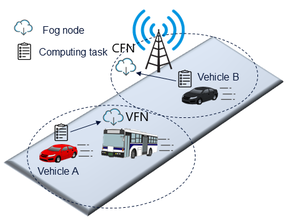Public defence in Networking Technology, M.Sc. Wencan Mao

When
Where
Event language(s)
The title of the thesis: Capacity Planning for Vehicular Fog Computing
Doctoral student: Wencan Mao
Opponent: Prof. Schahram Dustdar, TU Wien, Austria
Custos: Prof. Yu Xiao, Aalto University School of Electrical Engineering, Department of Information and Communications Engineering
The multidisciplinary research was conducted between the School of Electrical Engineering (ELEC) and the School of Science (SCI), co-supervised by Assoc. Prof. Yu Xiao and Prof. Antti Ylä-Jääski. The results of this research can contribute to the development of edge and fog computing, the Internet of Vehicles (IoV), and intelligent transportation systems (ITS). According to the Global Forecast report, the global market size of autonomous vehicles is expected to increase three times by 2030. The strict latency constraints of emerging vehicular applications make it unfeasible to forward sensing data from vehicles to the cloud for processing. Fog computing shortens the network latency by moving computation close to the location where the data is generated. Inspired by the high spatio-temporal diversity of vehicular traffic and the advanced vehicle-to-everything communications in 5G and beyond networks, vehicular fog computing (VFC) proposes to complement stationary fog nodes co-located with cellular base stations (i.e., CFNs) with mobile ones carried by vehicles (i.e., VFNs) in a cost-efficient way.
This research focuses on capacity planning for VFC. The objective of capacity planning is to maximize the techno-economic performance of VFC in terms of profit and quality of service (QoS). A data-driven methodology is used to decide the long-term and short-term capacity plans for VFC using optimization methods and reinforcement learning. We found the potential of deploying mobile computational resources to complement the stational ones with cost efficiency, and the decision can be calculated from a long time range to close to real-time. Experimental results show that our algorithms can adapt to the uncertainty in the environment, such as fast-changing demand and dynamic traffic situations. Furthermore, they can be applied to real-world scenarios, even with many client vehicles and VFNs. In addition, we proposed a data-driven simulator platform to evaluate the techno-economic performance of the capacity plans and compare the results in Helsinki downtown versus suburb, on weekdays versus weekends.
The evaluation of the developed frameworks indicates their applicability for enabling a QoS-guaranteed and cost-efficient VFC service. We believe that the results of this work can contribute to the development of VFC for next-generation vehicular applications in the future.
Thesis available for public display 10 days prior to the defence at: https://aaltodoc.aalto.fi/doc_public/eonly/riiputus/
Contact information:
| wencan.mao@aalto.fi | |
| Mobile | +358406885986 |
Doctoral theses in the School of Electrical Engineering: https://aaltodoc.aalto.fi/handle/123456789/53






